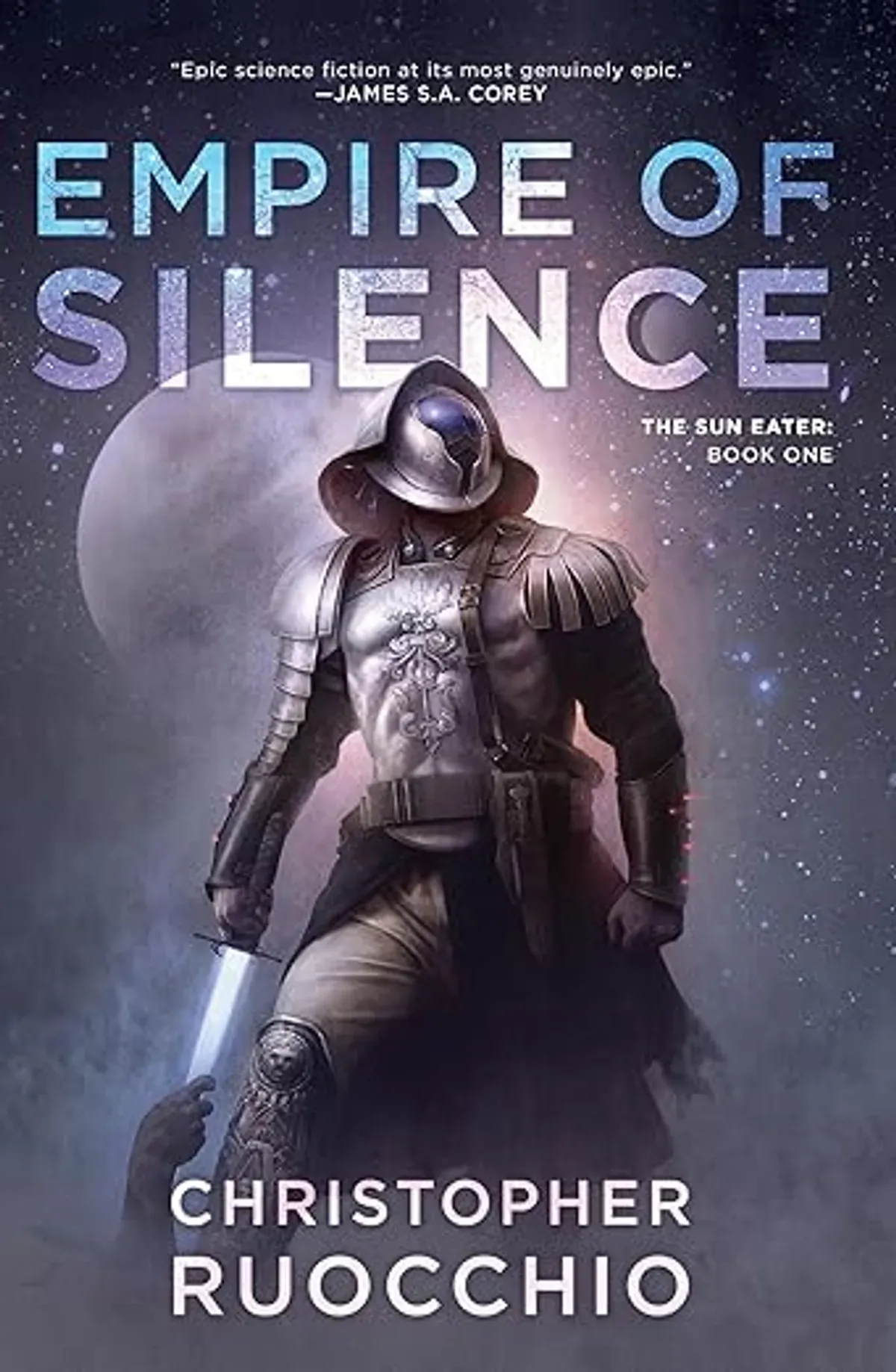Morning Star
by Pierce Brown
Reviewed by Devin Ford on March 29, 2025
Est. Reading Time: 12 min

Quick Info
Title: Morning Star
Author: Pierce Brown
Series: Red Rising Saga (Book 3)
Published: February 9, 2016
ISBN-13: 9780345539847
At a Glance: From Broken Prisoner to Revolution Leader
Morning Star begins with Darrow at his lowest: He endures capture and torture which leaves him broken after the catastrophic betrayal at the conclusion of Golden Son. After spending nine months trapped in a dark pit at the hands of his archenemy the Jackal Darrow needs to rebuild both his physical and mental strength when his allies execute a risky rescue mission. Reuniting with the Sons of Ares and the underground resistance known as The Rising, Darrow faces new challenges: Darrow needs to unite divided groups under his command while restoring faith among estranged supporters and formulating plans to overcome the Jackal and dismantle an oppressive Society. Darrow spearheads a rebellion across Mars’ mines and Jupiter’s moons to Luna’s palaces while facing severe challenges which force him to make both essential sacrifices and ethically dubious choices. While battle lines form and betrayals grow alongside diminishing hopes for victory Darrow faces a crucial choice about his future leadership and personal path even as his own revolution endangers all his loved ones. The final book of the trilogy balances enormous space battles with personal moral questions and provides an emotionally fulfilling end to Darrow’s individual story.
Revolutionary Battlefields: A Society Fracturing
Morning Star finalizes the trilogy’s worldbuilding by disclosing both the full extent of the Society’s authority and its weaknesses. While Red Rising centered its story on Mars and Golden Son grew to include planetary politics this last book captures the entire Solar System’s civil war which began when Darrow exposed the truth and depicts how each planet and moon reacted to this revolutionary turning point. Brown establishes unique settings spanning the industrial planet Mars and the wealthy moon Luna to demonstrate social stratification and varied resistance methods throughout the color hierarchy.
The political landscape becomes more multifaceted when different Gold factions show divided reactions to the growing rebellion. As the Moon Lords, Rim dominions, and Core powers compete against one another they simultaneously face insurgencies from below resulting in a complex conflict that surpasses basic oppressor-versus-oppressed scenarios. The presence of factional complexity creates substantial strategic difficulties for the revolutionaries because it requires them to form challenging alliances and make difficult compromises that evaluate Darrow’s leadership abilities.
Brown’s writing stands out for its depiction of lower colors who bring unique skills to the rebellion beyond just numbers. Blue rebels destroy control systems on vessels while green insurgents control communication channels and obsidian warriors introduce their distinct combat traditions to the revolutionary cause. The revolution exhibits collective effort instead of relying solely on Darrow’s exceptional abilities which addresses the common narrative flaw of a single hero driving all change.
Previous novels’ technologies such as gravBoots, razors, and starShells find enhanced use in major combat situations. Brown illustrates how these technologies shape strategic approaches for space battles and ground combat by producing authentic battle scenes that adhere to established universe rules instead of serving as convenient plot devices.
The worldbuilding shows weaknesses in its complete exploration of the cultural aspects of this divided society. The accelerating conflict in the narrative leads to less focus on promising elements introduced earlier such as the Roman-inspired cultural markers belonging to the Gold houses. Throughout the revolution’s progression opportunities for deeper sociological exploration remain unexplored.
Leading from Brokenness: Character Evolution Through Trauma
Darrow transforms from being a broken prisoner to emerge as a revolutionary leader in a compelling narrative journey. The brutal captivity and torture he endured makes him fundamentally reassess his methods and motivations alongside his entire sense of identity. Through the restoration of his physical form alongside his mental resilience emerges a protagonist who understands the complexities of trust and leadership after enduring profound sacrifices.
Darrow’s evolution stands out because Brown demonstrates a careful balance between his superior skills and true vulnerability. The consequences of his failures in Golden Son require him to use strategic insight and emotional intelligence to address them. The protagonist demonstrates maturity by leading through shared purpose and inspiration instead of relying solely on his superior skills.
The expanded character development gives depth to supporting roles that surpass their original characterizations. The promotion of Sevro to a leadership role challenges both his allegiances and tactics while uncovering more complex layers of his character. Mustang matches Darrow’s strategic mindset while applying her unique revolutionary methodology. The transformation of Victra from a privileged Gold into a dedicated revolutionary stands as the trilogy’s most powerful character development.
Brown shows exceptional skill when creating antagonistic characters. The book provides expanded development for the Jackal character which uncovers the psychological roots behind his deliberate acts of cruelty. Octavia au Lune stands as the ultimate Sovereign enemy whose political skills make her opponents unable to defeat her through fighting ability alone.
The occasional inconsistency in secondary characters’ responses to revolutionary stresses stops character development from reaching perfection. The narrative accelerates toward its conclusion while sacrificing nuance for plot expediency when former enemies join the cause through abrupt transformations.
Revolutionary Crescendo: Plot Balancing Personal and Political
The narrative framework of Morning Star strikes a successful balance between personal character struggles and large-scale revolutionary battles. Darrow’s initial imprisonment and subsequent rescue sets up physical and psychological stakes which anchor the broader political conflict to personal experiences. The story achieves an epic scale while maintaining deeply personal significance.
The narrative’s central chapters illustrate the difficulties encountered when establishing and sustaining a revolutionary alliance. Brown avoids portraying an easy path to victory by introducing realistic obstacles and moral complexities within his narrative. Revolutionary forces have to deal with both outside adversaries and internal discord among factions which hold conflicting objectives.
The battle sequences function as complex tests that examine characters’ beliefs and relationships beyond being simple action setpieces. Brown effectively writes space warfare by blending technical accuracy with emotional depth. These battles have lasting effects that go beyond traditional wins and losses to transform alliances and expose true character under extreme conditions.
The last battles elevate the conflict from simple survival to encompass broader societal questions resulting from revolutionary change. The outcome emerges through a blend of tactical brilliance and ethical considerations instead of sheer military power.
The narrative stumbles when its pacing moves too quickly through crucial developments or employs convenient timing to solve key conflicts. As the story approaches the final act the main conflicts receive more focus leading to incomplete conclusions for some of the secondary plotlines.
Prose: Confident Voice for Epic Conclusion
The prose in Morning Star shows how Brown has developed since his first book because it manages to combine intense action scenes with deep philosophical thoughts. His descriptive strength reaches its peak in battle sequences where tactical complexity merges with emotional impact to create combat that remains significant beyond simple violence.
Effective character development emerges from dialogue which uses distinct voices to display both color conditioning and personal traits. Natural dialogues between Darrow and his inner circle demonstrate intricate relationships which build emotional depth and root the revolutionary struggle in human connection instead of exposition.
Through internal monologue Darrow’s changing perspective becomes clear to readers without resorting to excessive self-reflection. The protagonist’s struggle to reconcile his ethical principles with unavoidable compromises offers real philosophical insight while maintaining the story’s forward motion.
Darrow’s reflective passages reveal stylistic touches that transform the prose from basic functionality into impressive literary achievements. The text clearly depicts how revolution brings about transformative changes in people who find themselves trapped in its operations.
Between the Sheets: Revolution Over Romance
BroMantasy Spice Rating
Barely There
(Chaste Romance)
The trilogy continues to show restraint with its romantic content as Morning Star achieves a spice level of 🌶️ (1.0). The narrative shows that established relationships grow stronger through common hardships and selflessness but maintains emotional intimacy in revolutionary conflict stories.
The novel uses minimal romantic aspects as tools for character growth instead of traditional romantic satisfaction. The personal bonds formed during warfare and deception provide essential emotional contrast to surrounding violence by reinforcing characters’ motives while keeping the main revolutionary plot intact.
Male readers skeptical about romance stories will find the romantic elements seamlessly woven into a narrative focused on military strategy and revolutionary politics. These narrative elements deepen character richness while ensuring science fiction fans remain engaged.
Bro Reading Comfort: Combat-Focused Content
The book Morning Star displays very few issues for public reading at the rating of 😳 (1.0). The cover maintains the series’ symbolic imagery style instead of romantic visuals while the narrative primarily explores revolutionary combat rather than romantic connections.
The limited instances of emotional exposure emerge organically from intense situations to prevent awkward content from reaching the public eye. The book Morning Star maintains its status as military science fiction and revolutionary narrative which appeals to male readers who want to avoid being labeled as romance readers.
Potential reading discomfort arises from graphic violence instead of romantic content in line with previous volumes. Brown presents torture and warfare casualties without flinching to show conflict’s true harshness instead of creating shock value.
Darkness Factor: The Full Cost of Revolution
The novel Morning Star achieves the highest darkness rating of 5.0 by presenting an unrelenting depiction of revolution’s brutal reality and its consequences. The initial scenes of Darrow’s torture and imprisonment set a tone which pays homage to the real torment that fighting against oppressive systems entails.
The realm of darkness includes not only physical violence but also the ethical sacrifices demanded by revolutionary needs. Characters in the pursuit of greater objectives choose to break their own ethical rules which leads to moral ambiguity that dismantles simple good-versus-evil scenarios. Darrow faces a persistent dilemma as he tries to align his noble goals with the harsh methods necessary to reach them which creates ongoing conflict between his objectives and actions that persists beyond his success.
The narrative avoids unnecessary darkness because it simultaneously advances character growth and investigates thematic elements. The story uses brutality to explore the transformative impacts of violence on both those who commit it and those who suffer from it, even when violence serves justice. The responses of secondary characters to moral pressures vary from one individual to another which demonstrates diverse outcomes instead of universal moral degradation or redemption through their experiences.
The darkness illustrates the real risks involved in dismantling an established system which helps build the world. Revolutionary stories that downplay the price of rebellion lose trustworthiness because Brown’s depiction of real sacrifices offers a truthful view of systemic change.
Book Battlefield: Trilogy Conclusion Comparisons
The final book of the original series Morning Star fulfills expectations set by earlier volumes while preserving the unique mixture of military tactics, political espionage, and character evolution that made the series stand out from its start.
The final installment of Brown’s series surpasses Mockingjay (The Hunger Games) and Allegiant (Divergent) in its depiction of political nuances and military tactics while keeping a solid character-driven narrative throughout its revolutionary storyline. Brown achieves consistent integration between character development and revolutionary themes where other works fall short at balancing individual narratives with social unrest.
Military science fiction fans who appreciate the tactical depth and psychological exploration found in Joe Haldeman’s The Forever War or John Scalzi’s Old Man’s War series will find similar elements in Morning Star, which integrates these components into a revolutionary storyline instead of traditional military frameworks.
Brown’s work stands apart from other revolutionary narratives because it openly explores the ethical dilemmas and necessary sacrifices involved in dismantling long-established systems. Morning Star examines revolution as a complex process with significant sacrifices and tough decisions while offering a deeper political analysis than other similar works.
Should You Bother?
For Readers of the Previous Books: Morning Star wraps up Darrow’s saga from Red Rising and Golden Son by delivering a fulfilling resolution to both personal and political elements. The character conflicts and relationships from earlier books reach their conclusion in a way that feels authentic instead of forced.
For Military Science Fiction Fans: The book seamlessly extends existing technologies into its space warfare and military strategy showing logical advancements instead of introducing new convenient capabilities. The combination of tactical operations on the battlefield with broader strategic planning creates warfare that appears technically convincing while delivering emotional resonance.
For Political Fiction Readers: The revolutionary dynamics depict authentic complexity that goes beyond simple oppressor-versus-oppressed binaries. Throughout the spectrum of political players and individuals responses to shifts in their environment are governed by personal advantage and ethical beliefs which generate political disputes that represent the chaotic nature of systemic alterations as opposed to simplistic revolutionary stories.
Final BroMantasy Verdict
The original Red Rising trilogy reaches its meaningful conclusion with Morning Star which showcases both the individual path of a revolutionary leader and the system-wide struggle he initiated. Though it doesn’t reach the flawless standard of Golden Son, this ultimate installment delivers complete resolutions to personal storylines and political disputes while recognizing the human and ethical expenses of revolution.
The book consistently delights readers through its combination of heart-pounding action sequences which unfold against a backdrop of authentic moral intricacies. The book’s space battles and ground assaults deliver intense action sequences that thrill readers who enjoy combat while its strategic challenges and moral choices engage intellects beyond visual entertainment. Brown maintains awareness about the transformative effects of violence on its users even during executions aimed at justice.
In Morning Star male readers find a protagonist who explores leadership and identity questions beyond just the revolutionary setting. The transition of Darrow from a shattered prisoner to a military leader and possible creator of a new society demonstrates a sophisticated analysis of masculinity which recognizes that both strength and vulnerability are essential to successful leadership.
The trilogy conclusion of Morning Star delivers resolution for current conflicts but maintains open-ended societal questions to validate the continuation of the series. The revolution toppled the old system yet recognized that constructing a better future demands continuous effort beyond just achieving victory in the last confrontation. The ending provides a satisfying narrative closure that avoids simplistic “happily ever after” endings.
The 4.0 rating recognizes the book’s considerable achievements in character development and thematic depth alongside its action sequences but notes problems with pacing and underdeveloped secondary character arcs due to the story’s focus on main conflicts. The book’s minor flaws stop it from reaching Golden Son’s almost flawless execution but they do not greatly reduce the trilogy conclusion’s overall enjoyment.
The first book Red Rising introduced its captivating world and protagonist while Golden Son widened the series’ scope and stakes; Morning Star completes the series with its anticipated revolutionary resolution while maintaining the moral depth and character-driven storytelling that set it apart from standard dystopian series. The ending of this story establishes Darrow’s concluding chapter and sets the stage for subsequent books to explore the intricate consequences of revolution.
You Might Also Enjoy
Frequently Asked Questions
Is this book part of a series?
Yes, this is book 3 in the Red Rising Saga series.
How spicy is the romance?
We rate the spice level at 🌶️ (1/5). Minimal romantic content in a narrative focused on revolution and survival
How uncomfortable is it to read in public?
We rate the public reading discomfort level at 😳 (1/5). Action-driven content with few concerns for public consumption
How dark are the themes in this book?
We rate the darkness level at 💀💀💀💀💀 (5/5). Unflinching depictions of torture, mass casualties, and the moral compromises of revolution
What age group is this book for?
This book is generally recommended for adult readers due to its mature themes. We recommend checking specific content warnings if you are sensitive to certain topics.





